Thought Leaders are defined as organisations or individuals that change attitudes and behaviours. A Thought Leadership approach gives brands a positive point of difference, forging stronger, more strategic relationships with key stakeholders, giving brands a range of competitive advantages.
A survey conducted by London-based TLG Communications lists India's top 20 corporate brands or Thought Leaders. The survey provides insights into three aspects of corporate reputation in a leading emerging market.
First, the specific benefits of being a Thought Leader; second, the core behaviours common to successful Thought Leaders; and third, entities whom local opinion formers recognise as Thought Leaders.
The study also provides three key insights:
1. CEOs can build a 'most trusted' and 'most admired' brand by defining their businesses as Thought Leaders in both western and emerging markets.
2. Thought Leadership status has a positive impact on corporate brand reputation, transcending geographies.
3. Opinion formers in very different markets and regions share similar values about corporate reputation and leadership.
And the following are the benefits of being a Thought Leader:
- Most Trusted
- Change Maker
- Most Admired
- Competitive Advantage
- Cool Factor
1. Infosys
Infosys has been ranked as the No. 1 Thought Leader in India. It is one of the few Indian companies that has changed the way the world looks at India.
No longer is India a land of snake charmers and beggars. It is now perceived as an economic giant to reckon with, bursting with brilliant software engineers and ambitious entrepreneurs. And Infosys is an symbol of India's information technology glory.
Infosys has many firsts to its name: The first Indian firm to list on Nasdaq; the first to offer stock options to its employees. . .
The idea of Infosys was born on a morning in January 1981. That fateful day, N R Narayana Murthy and six software engineers sat in his apartment debating how they could create a company to write software codes.
Six months later, Infosys was registered as a private limited company on July 2, 1981. Infosys co-founder N S Raghavan's house in Matunga, northcentral Mumbai, was its registered office. It was then known as Infosys Consultants Pvt Ltd.
The company's starting capital was $250. Murthy borrowed $250 from his wife Sudha to start the company. The front room of Murthy's home was Infosys' first office, although the registered office was Raghavan's home.
Murthy's six friends who joined hands to launch Infosys were Nandan Nilekani, N S Raghavan, S Gopalakrishnan, S D Shibulal, K Dinesh and Ashok Arora.
The rest is history.
So let us check out which are India's top 20 Thought Leaders.
Click NEXT to read on . . .
2. Tata Group
Brand Tata, as India's second most trusted brand and second most reputable Throught Leader', has been synonymous with trust for nearly a century and half. Among various composites, Tata scored highest for display of sincerity. But it scores lowest in the area of outward appearance, usually the most visible of the 10 composites.
The Tata Group is a true-blue Indian multinational with operations in 80 countries and comprises 114 companies and subsidiaries in eight business sectors.
This composite is very important in Brand Trust, since visible, external attributes are most often used to judge internal content and prowess.
The other composite on which Tata scores low is enthusiasm, demonstrated by lower values for the three attributes, vibrancy, proactive behaviour and competitive spirit.
Click NEXT to read on . . .
Image: Tata Group chairman Ratan Tata.
Photographs: Reuters
The 20 top 'thought leaders' in India
Last updated on: June 24, 2011 13:45 IST
Thought Leaders are defined as organisations or individuals that change attitudes and behaviours. A Thought Leadership approach gives brands a positive point of difference, forging stronger, more strategic relationships with key stakeholders, giving brands a range of competitive advantages.
A survey conducted by London-based TLG Communications lists India's top 20 corporate brands or Thought Leaders. The survey provides insights into three aspects of corporate reputation in a leading emerging market.
First, the specific benefits of being a Thought Leader; second, the core behaviours common to successful Thought Leaders; and third, entities whom local opinion formers recognise as Thought Leaders.
The study also provides three key insights:
1. CEOs can build a 'most trusted' and 'most admired' brand by defining their businesses as Thought Leaders in both western and emerging markets.
2. Thought Leadership status has a positive impact on corporate brand reputation, transcending geographies.
3. Opinion formers in very different markets and regions share similar values about corporate reputation and leadership.
And the following are the benefits of being a Thought Leader:
- Most Trusted
- Change Maker
- Most Admired
- Competitive Advantage
- Cool Factor
So let us check out which are India's top 20 Thought Leaders.
Click
NEXT to read on . . .
The 20 top 'thought leaders' in India
Last updated on: June 24, 2011 13:45 IST
1. Infosys
Infosys has been ranked as the No. 1 Thought Leader in India. It is one of the few Indian companies that has changed the way the world looks at India.
No longer is India a land of snake charmers and beggars. It is now perceived as an economic giant to reckon with, bursting with brilliant software engineers and ambitious entrepreneurs. And Infosys is an symbol of India's information technology glory.
Infosys has many firsts to its name: The first Indian firm to list on Nasdaq; the first to offer stock options to its employees. . .
The idea of Infosys was born on a morning in January 1981. That fateful day, N R Narayana Murthy and six software engineers sat in his apartment debating how they could create a company to write software codes.
Six months later, Infosys was registered as a private limited company on July 2, 1981. Infosys co-founder N S Raghavan's house in Matunga, northcentral Mumbai, was its registered office. It was then known as Infosys Consultants Pvt Ltd.
The company's starting capital was $250. Murthy borrowed $250 from his wife Sudha to start the company. The front room of Murthy's home was Infosys' first office, although the registered office was Raghavan's home.
Murthy's six friends who joined hands to launch Infosys were Nandan Nilekani, N S Raghavan, S Gopalakrishnan, S D Shibulal, K Dinesh and Ashok Arora.
The rest is history.
Click
NEXT to read on . . .
Image: Infosys campus in Bengaluru.
Photographs: Rediff Archive
The 20 top 'thought leaders' in India
Last updated on: June 24, 2011 13:45 IST
2. Tata Group
Brand Tata, as India's second most trusted brand and second most reputable Throught Leader', has been synonymous with trust for nearly a century and half. Among various composites, Tata scored highest for display of sincerity. But it scores lowest in the area of outward appearance, usually the most visible of the 10 composites.
The Tata Group is a true-blue Indian multinational with operations in 80 countries and comprises 114 companies and subsidiaries in eight business sectors.
This composite is very important in Brand Trust, since visible, external attributes are most often used to judge internal content and prowess.
The other composite on which Tata scores low is enthusiasm, demonstrated by lower values for the three attributes, vibrancy, proactive behaviour and competitive spirit.
Click
NEXT to read on . . .
Image: Tata Group chairman Ratan Tata.
Photographs: Reuters
The 20 top 'thought leaders' in India
Last updated on: June 24, 2011 13:45 IST
3. Google India
Search giant Google India has been ranked third in a list of India's top corporate brands by TLG.
Google is one of the few global companies to figure in the list that has been dominated by India's domestic brands.
Google employs over 2,000 people in India. India is an important growth country for the global search giant. With Internet users growing at 50 per cent year-on-year, the company sees India as a tremendous opportunity.
The company has also been voted often as being one of the best places to work in by Indian software professionals, ahead of other global software giants like Oracle, Accenture, Microsoft and IBM.
Click
NEXT to read on . . .
Photographs: Reuters
The 20 top 'thought leaders' in India
Last updated on: June 24, 2011 13:45 IST
4. Maruti Suzuki
Maruti has been ranking as the 4th topmost Thought Leader in India and is considered to be one of the most consistent corporate brands in the country.
Further, the brand which has had a long journey in India, still feels it has miles to go. To retain its position the company is now offering new variants to suit the requirements of the Indian consumer.
The success of Maruti Suzuki in India is largely attributed to the enthusiasm of salespeople at the dealership, as well as their ability to understand customer requirements and provide knowledgeable answers to queries.
Click
NEXT to read on . . .
Photographs: Reuters
The 20 top 'thought leaders' in India
Last updated on: June 24, 2011 13:45 IST
5. Larsen & Toubro
One of India's most respected companies, engineering giant Larsen & Toubro, has been ranked as the 5th top Thought Leader in India, in a study conducted by TLG Communications.
L&T is the biggest legacy of two Danish Engineers, who built a world-class organisation that is professionally managed and a leader in India's engineering and construction industry.
It was the business of cement that brought the young Henning Holck-Larsen and S K Toubro into India. They arrived on Indian shores as representatives of the Danish engineering firm F L Smidth & Co in connection with the merger of cement companies that later grouped into the Associated Cement Companies.
Together, Holck-Larsen and Toubro, founded the partnership firm of L&T in 1938, which was converted into a limited company on February 7, 1946.
Today, this has metamorphosed into one of India's biggest success stories. The company has grown from humble origins to a large conglomerate spanning engineering and construction.
Click
NEXT to read on . . .
Image: Larsen and Toubro chairman A M Naik.
Photographs: Reuters
The 20 top 'thought leaders' in India
Last updated on: June 24, 2011 13:45 IST
6. Nokia
Despite the growing challenges and competition in the mobile handset space, Nokia successfully manages to grab the number 6 spot in a list of India's top Thought Leaders comprising the nation's most trusted corporates.
Nokia certainly plays the key cog in India's wireless market. The company has constantly delivered its promise to offer unique products to suits the needs of the Indian consumers. For instance, the incorporation of flashlight in the handset is a very Indian feature.
Such innovation has helped Nokia gain that trust and make a connection with its customers in India.
Click
NEXT to read on . . .
Photographs: Reuters
The 20 top 'thought leaders' in India
Last updated on: June 24, 2011 13:45 IST
7. State Bank of India
TLG ranks State Bank of India as the seventh top corporate brand in India.
SBI is the largest state-owned banking and financial services company in India, in terms of revenues, profits, assets, market capitalisation.
In the past, the bank has won the prestigious Asian Banker Achievement Award for being the strongest bank in the Asia Pacific region.
SBI is also the favoured bank across India, especially in the eastern and southern regions of India.
Click
NEXT to read on . . .
Image: (Inset) SBI chairman Pratip Chaudhuri.
Photographs: Reuters
The 20 top 'thought leaders' in India
Last updated on: June 24, 2011 13:45 IST
8. Facebook
The Mark Zuckerberg-founded social networking giant, Facebook, has been ranked the 8th top corporate brand or 'Thought Leader' in India.
The phenomenal growth of Facebook has made it a household name in the country.
Facebook, along with Nokia and Google India, is one of the few
global corporate brands to be ranked among the top 'Thought Leaders' in India.
Click
NEXT to read on . . .
Photographs: Reuters
The 20 top 'thought leaders' in India
Last updated on: June 24, 2011 13:45 IST
9. Hindustan Unilever Ltd
Hindustan Unilver Ltd is India's largest fast moving consumer goods company. The survey lists it as India's 9th top Thought Leader.
In an earlier study too, the FMCG major beat its parent company, Unilever, to be ranked as the 69th top brand in the world. Its Anglo-Dutch parent company, Unilever, owns a 52 per cent stake in HUL.
HUL was formed in 1933 as Lever Brothers India Ltd and came into being in 1956 as Hindustan Lever Ltd.
The company which employs more than 15,000 people is led by chairman Harish Manwani and chief executive Nitin Paranjpe.
Click
NEXT to read on . . .
Photographs: Rediff Archive
The 20 top 'thought leaders' in India
Last updated on: June 24, 2011 13:45 IST
10. Mahindra & Mahindra
Mahindra & Mahindra is one of India's largest automobile manufacturers and the country's 10th top corporate brand, according to the TLG survey.
It is a multinational conglomerate with interests in financial services, information technology, infrastructure, farm equipment, etc. Mahindra is one of the most reputable Indian brands. Anand Mahindra is the vice chairman of Mahindra and Mahindra.
The BRICS Index of Thought Leaders 2011 highlights the most successful BRICS Thought Leaders, according to Indian opinion formers.
The research was conducted by GlobeScan (www.globescan.com). Opinion formers were drawn from business, media, government and NGOs in India between April 18 and June 6 2011.
Respondents included company directors, newspaper editors, senior politicians and charity leaders.
Click
NEXT to read on . . .
Image: Anand Mahindra, vice chairman, Mahindra and Mahindra.
Photographs: Reuters
The 20 top 'thought leaders' in India
Last updated on: June 24, 2011 13:45 IST
11. Hero Honda Motors
Hero Honda Motors has been recognised as the most trusted two-wheeler manufacturer in India. In the index of India's top 20 Thought Leaders, the two-wheeler major has been ranked 11th.
Known for its upbeat technology and product offering, Hero Honda has worked in the last three to four years to create enough differentiation between all its brands. It has also worked on its marketing skills. Hero Honda also has a strong position in the rural market.
Now, with the exit of Japanese Honda Motor Corp from a joint venture with the Hero group, it is too see how the Hero group maintains its successful position.
Click
NEXT to read on . . .
Image: Brijmohan Lal and Pawan Munjal.
Photographs: Reuters
The 20 top 'thought leaders' in India
Last updated on: June 24, 2011 13:45 IST
12. Life Insurance Corporation of India
Given the tremendous goodwill that LIC enjoys with the Indian masses -- so much so that 'LIC' has become a generic name for life insurance -- and the service it has been providing since ages, it is hardly a surprise that LIC is one of the most trusted brands in India.
Featuring among the top 20 list of most trusted corporate brands or Thought Leaders in India, LIC shows how deeply it has etched itself in the minds of stakeholders. The life insurer has been ranked as the 12th in the TLG list.
LIC has been in India for over 50 years, and it only proves that it's the trust with consumers that helps the company grow.
However, according to the report the brand scores on other aspects like enthusiasm and external appearance.
Click
NEXT to read on . . .
Photographs: Uttam Ghosh/Rediff.com
The 20 top 'thought leaders' in India
Last updated on: June 24, 2011 13:45 IST
13. Bharti Airtel
Telecom giant Bharti Airtel has been ranekd the 13th most trusted Thought Leader in India, and the mobile operator to be ranked in the BRICS Index of Thought Leaders in India..
The Bharti Airtel brand is used for mobile services, DTH, fixed-line telephony, IPTV, broadband as well as managed communication services for large corporations.
Customers thus range from socio-economic categories A and B to below the poverty line, urban and rural, multinationals to small businesses.
Click
NEXT to read on . . .
Photographs: Reuters
The 20 top 'thought leaders' in India
Last updated on: June 24, 2011 13:45 IST
14. Oil and Natural Gas Corporation
ONGC, which contributes 77 per cent of India's crude oil production and 81 per cent of natural gas, has been ranked 14th in the list of India's top 20 Thought Leaders.
The public sector oil and gas giant is also a Fortune Global 500 company and one of the highest profit-making corporations in India.
The PSU giant was recently praised by Transparency International, the global corruption watchdog, for its efforts to be transparent in three specific areas: reporting on anti-corruption programmes, organisational disclosure (disclosure of operations, subsidiaries and partners) and country-level disclosure of financial and technical data.
Click
NEXT to read on . . .
Photographs: Reuters
The 20 top 'thought leaders' in India
Last updated on: June 24, 2011 13:45 IST
15. Aditya Birla Group A $30-billion corporation, the Aditya Birla Group is a Fortune 500 company. It employs about 130,600 people across 27 nations that it operates in.
In India, the group has been adjudged one of the best employers in the country and among the top 20 in Asia.
Globally, the Aditya Birla Group is metals powerhouse, among the world's most cost-efficient aluminium and copper producers. Hindalco-Novelis is the largest aluminium rolling company. It is one of the three biggest producers of primary aluminium in Asia, with the largest single location copper smelter.
In India, the group's social projects span 3,000 villages. It reaches out to seven million people annually through the Aditya Birla Centre for Community Initiatives and Rural Development.
Click
NEXT to read on . . .
Image: A V Birla Group chairman Kumaramangalam Birla.
The 20 top 'thought leaders' in India
Last updated on: June 24, 2011 13:45 IST
16. The Oberoi Group
Founded in 1934, the group operates in 27 hotels and three cruisers in five countries under the luxury 'Oberoi' and five-star 'Trident' brands.
It is also engaged in flight catering, airport restaurants, travel and tour services, car rentals, project management and corporate air charters.
It established The Oberoi Centre of Learning and Development for training in hospitality management in 1966.
The Trident and Oberoi hotels in south Mumbai were subject to dastardly terrorist attacks last year, but are now up and running again.
According to the TLG study, there are five defining behaviours of Thought Leaders:
1. Clarity
2. Objective
3. Authenticity
4. Pioneer
5. Rigour
Click
NEXT to read on . . .
Photographs: Reuters
The 20 top 'thought leaders' in India
Last updated on: June 24, 2011 13:45 IST
17. HDFC Bank
HDFC Bank has been ranked the 17th top Thought Leader in India.
The bank is a financial services major with more than 1,700 branches across India. It is headquartered in Mumbai.
The bank was promoted by the Housing Development Finance Corporation.
Aditya Puri is the managing director of the bank.
Click
NEXT to read on . . .
Image: (Inset) HDFC Bank MD Aditya Puri.
The 20 top 'thought leaders' in India
Last updated on: June 24, 2011 13:45 IST
18. Dr Reddy's Laboratories
Dr Reddy's Laboratories, one of India's top pharmaceuticals firms, has been ranked the 18th top Thought Leader in India.
It was set up in February 1984 by Anji Reddy, a scientist in the state-owned Indian Drugs and Pharmaceuticals Ltd. It took the company no less than 25 years to report a domestic turnover of Rs 1,000 crore (Rs 10 billion)!
But Dr Reddy's cannot be compared with others. For a good part of its 25 years, it was focused on the West. Governments there wanted to break the stranglehold of Big Pharma and bring down the cost of medication through inexpensive generic products.
This opened a whole new opportunity for Indian pharmaceutical companies. The absence of product patents had made them experts in reverse engineering. This, coupled with their low production costs, put them in a position from where they could command this market.
Dr Reddy's and Ranbaxy led the Indian charge. They acquired assets abroad, got into patent litigation with Big Pharma and also attempted to discover new molecules. But in the last few years, they ceased to be the movers and shakers of the industry.
Click
NEXT to read on . . .
Image: A facility of Dr Reddy's Labs.
The 20 top 'thought leaders' in India
Last updated on: June 24, 2011 13:45 IST
19. Ranbaxy
Ranbaxy, one of India's best know drug majors, is 19th on the list of top 20 Thought Leaders in India.
Brothers Malvinder and Shivinder Singh made a huge fortune when they sold their stake in Ranbaxy to Daiichi Sankyo of Japan for over Rs 9,000 crore (Rs 90 billion).
The Singh family has seen its share of bitterness in the past. Bhai Manjit Singh and Analjit Singh for many years complained that they were shortchanged when the brothers split in the early 1990s and Ranbaxy went to their elder brother, Parvinder Singh.
A few years later, there was an awkward boardroom battle in which Parvinder Singh worsted his father, Bhai Mohan Singh. Malvinder and Shivinder own the family business equally - Fortis Healthcare and Religare - in order to avoid any conflict over ownership.
Click
NEXT to read on . . .
Photographs: Reuters
The 20 top 'thought leaders' in India
Last updated on: June 24, 2011 13:45 IST
20. Hyundai Motor India Ltd
Hyundai Motor India has been ranked the 20th top Thought Leader in India.
Hyundai Motor India Ltd is a wholly owned subsidiary of Hyundai Motor Company, South Korea and is the largest passenger car exporter and the second largest car manufacturer in India.
HMIL presently markets 7 models of passenger cars across segments. The A2 segment includes the Santro, i10 and the i20, the A3 segment includes the Accent and the Verna, the A5 segment includes the Sonata Transform and the SUV segment includes the Santa Fe.
HMIL's fully integrated state-of-the-art manufacturing plant near Chennai boasts of the most advanced production, quality and testing capabilities in the country.
To cater to rising demand, HMIL commissioned its second plant in February 2008, which produces an additional 300,000 units per annum, raising HMIL's total production capacity to 600,000 units per annum.
As HMC's global export hub for compact cars, HMIL is the first automotive company in India to achieve the export of 10 lakh (1 million) cars in just over a decade.
Photographs: Reuters

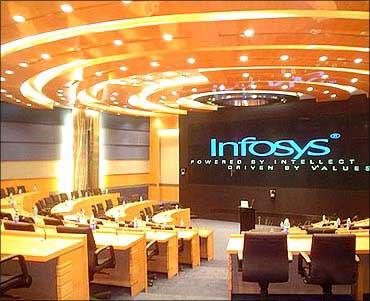
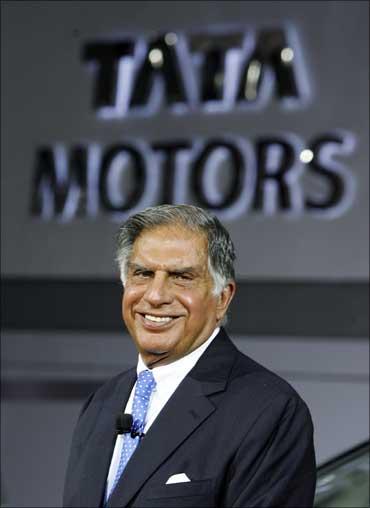
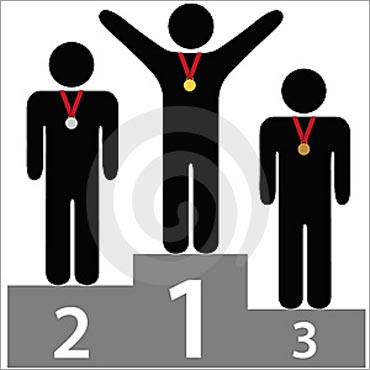
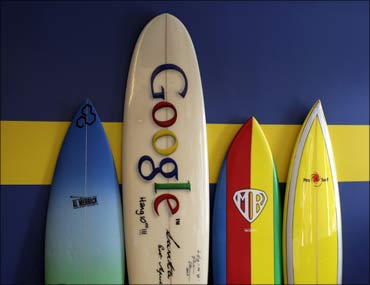
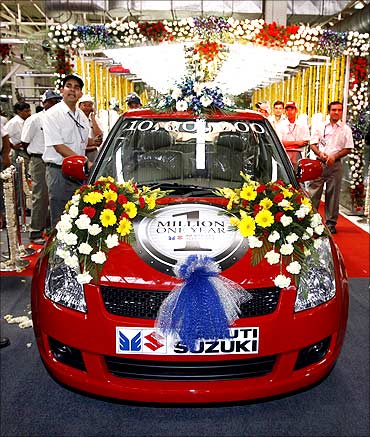
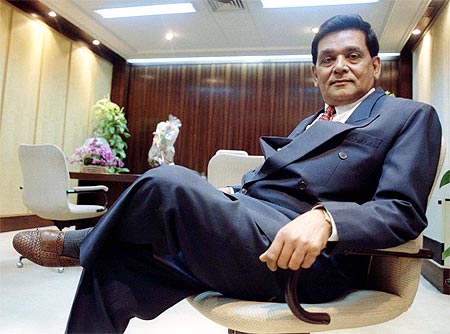
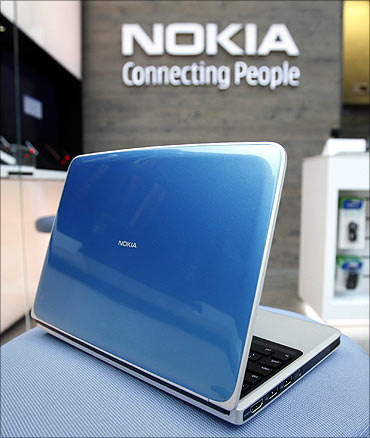
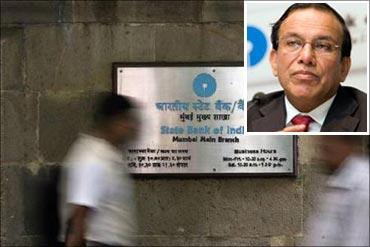
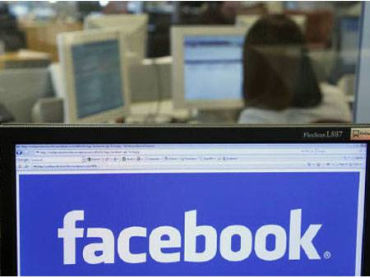
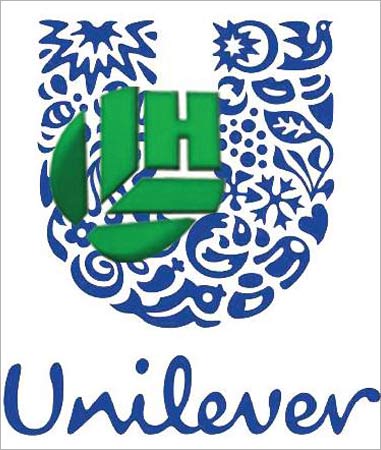
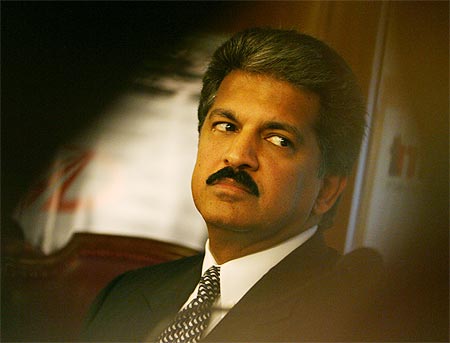
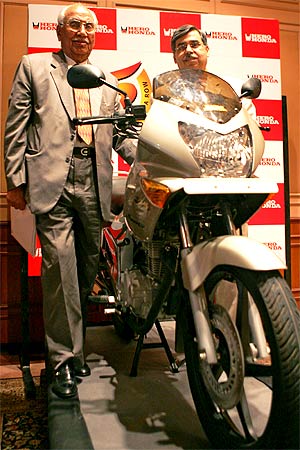

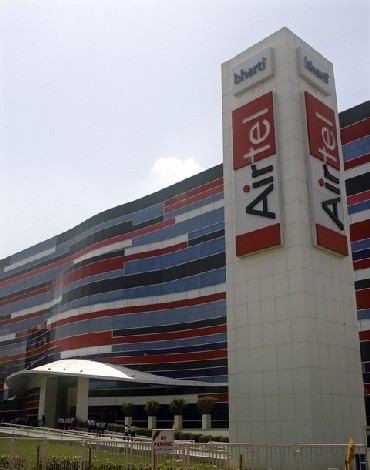
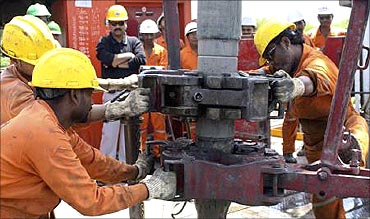





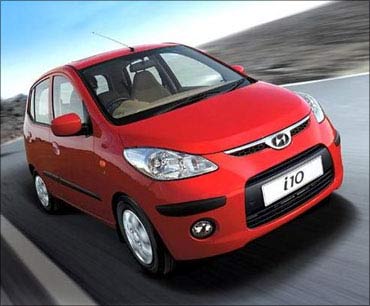
this
Users
Comment
article